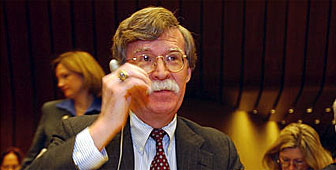US accuses countries of producing germ weapons

The United States has accused Iraq and North Korea of violating a treaty banning germ warfare at a biological weapons conference in Geneva.
Four other countries cited by the US as being at various stages in the development of weapons were Libya, Syria, Iran and the Sudan.
The US Under-Secretary for Arms Control and International Security, John Bolton, told conference delegates that Iraq has produced and stockpiled biological warfare agents and weapons despite a 1972 agreement forbidding such production.
“The existence of Iraq’s programme is beyond dispute,” Bolton said.
Iraq was quick to reject the allegation that it was violating the global ban on germ warfare and said the US was making the claim as a pretext for an attack on Baghdad.
US concern
“We are also quite concerned about Iran,” Bolton said, and questions have been raised about Syria’s ability to produce biological weapons. Syria, which has not signed the treaty, may be able to produce small quantities of biological weapons, Bolton said.
Despite its strong position on adherence to the 1972 agreement, the US rejected a proposal earlier this year that would have made it easier to check on whether member states were abiding by the agreement. Bolton said at the time the proposal would have done little to stop the development of the weapons and was “unworkable.”
US officials also said then that the proposed changes could threaten national security, and the confidentiality of business information.
Tough measures
Now, however, Swiss officials expect the US to propose tough measures to enforce the germ warfare ban.
Many of the delegates from 144 countries who are attending the conference have been particularly interested in how the US position may have changed following the September 11 terrorist attacks against the World Trade Center and the Pentagon, as well as continuing anthrax attacks in the United States.
The Swiss representative to the conference, Christian Faessler, says the Americans will now be a driving force behind measures to enforce the treaty.
“I think the moment has come to adopt measures on a new basis,” Faessler told swissinfo.
“The Americans, like everyone else, are fully aware of the urgency of the situation and of adopting measures to fight against the threat of biological weapons.”
The meeting, formally known as the Fifth Review Conference for the 1972 Biological Weapons Convention, is being presided over by the Hungarian ambassador, Tibor Tóth.
Tóth has called for criminal sanctions against people who violate ther germ warfare convention.
swissinfo with agencies

In compliance with the JTI standards
More: SWI swissinfo.ch certified by the Journalism Trust Initiative
You can find an overview of ongoing debates with our journalists here . Please join us!
If you want to start a conversation about a topic raised in this article or want to report factual errors, email us at english@swissinfo.ch.